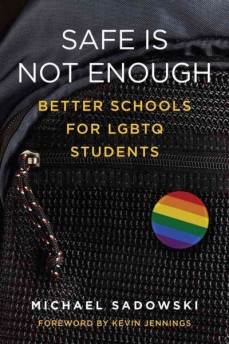Safe Is Not Enough: Better Schools for LGBTQ Students by Michael Sadowski | SLJ Review
![]() SADOWSKI, Michael. Safe Is Not Enough: Better Schools for LGBTQ Students. 232p. (Youth Development and Education Series). chart. index. notes. Harvard Education. Aug. 2016. pap. $19.99. ISBN 9781612509426.
SADOWSKI, Michael. Safe Is Not Enough: Better Schools for LGBTQ Students. 232p. (Youth Development and Education Series). chart. index. notes. Harvard Education. Aug. 2016. pap. $19.99. ISBN 9781612509426.
 In his introduction, Sadowski writes, “Safety is an essential baseline…but it is not a sufficient goal in itself.” Aimed at educators, this book lays out many clear and detailed ways that schools can better meet the needs of LGBTQ students. The author advocates for moving beyond antibullying policies, safe spaces (often indicated by stickers), and gay-straight alliances (GSAs) to creating a more inclusive curriculum and environment. Chapters address integrating LGBTQ issues in the classroom, comprehensive inclusiveness throughout the school, the important work some GSAs are doing, the impact of race and socioeconomic status, transgender students’ unique needs, and avenues beyond GSAs for students to meet and talk. Sadowski profiles educators and programs, looks at policies, and offers arguments and counterarguments. He notes that progress is not uniform throughout the country and that students in some identity categories are more at risk than others. Additionally, there is a chapter dedicated to helping schools implement the ideas outlined here. It is clear that everyone benefits from more inclusive curriculum and policies and that moving beyond the idea of just being safe sends a stronger message of affirmation, value, respect, and acceptance. Though this is a brief volume, the detailed suggestions for advocacy and change are comprehensive and persuasive. Appended are a course syllabus, handouts, GSA materials, and a policy regarding transgender students that can be adapted for use. Online resources addressing curriculum, student support, and more are included. VERDICT As useful as it is essential.
In his introduction, Sadowski writes, “Safety is an essential baseline…but it is not a sufficient goal in itself.” Aimed at educators, this book lays out many clear and detailed ways that schools can better meet the needs of LGBTQ students. The author advocates for moving beyond antibullying policies, safe spaces (often indicated by stickers), and gay-straight alliances (GSAs) to creating a more inclusive curriculum and environment. Chapters address integrating LGBTQ issues in the classroom, comprehensive inclusiveness throughout the school, the important work some GSAs are doing, the impact of race and socioeconomic status, transgender students’ unique needs, and avenues beyond GSAs for students to meet and talk. Sadowski profiles educators and programs, looks at policies, and offers arguments and counterarguments. He notes that progress is not uniform throughout the country and that students in some identity categories are more at risk than others. Additionally, there is a chapter dedicated to helping schools implement the ideas outlined here. It is clear that everyone benefits from more inclusive curriculum and policies and that moving beyond the idea of just being safe sends a stronger message of affirmation, value, respect, and acceptance. Though this is a brief volume, the detailed suggestions for advocacy and change are comprehensive and persuasive. Appended are a course syllabus, handouts, GSA materials, and a policy regarding transgender students that can be adapted for use. Online resources addressing curriculum, student support, and more are included. VERDICT As useful as it is essential.
This review was published in the School Library Journal November 2016 issue.
RELATED
The job outlook in 2030: Librarians will be in demand
The job outlook in 2030: Librarians will be in demand
ALREADY A SUBSCRIBER? LOG IN
We are currently offering this content for free. Sign up now to activate your personal profile, where you can save articles for future viewing






Add Comment :-
Be the first reader to comment.
Comment Policy:
Comment should not be empty !!!